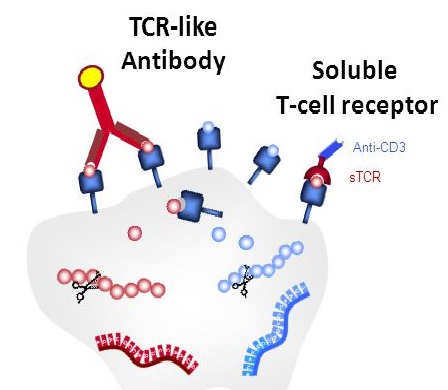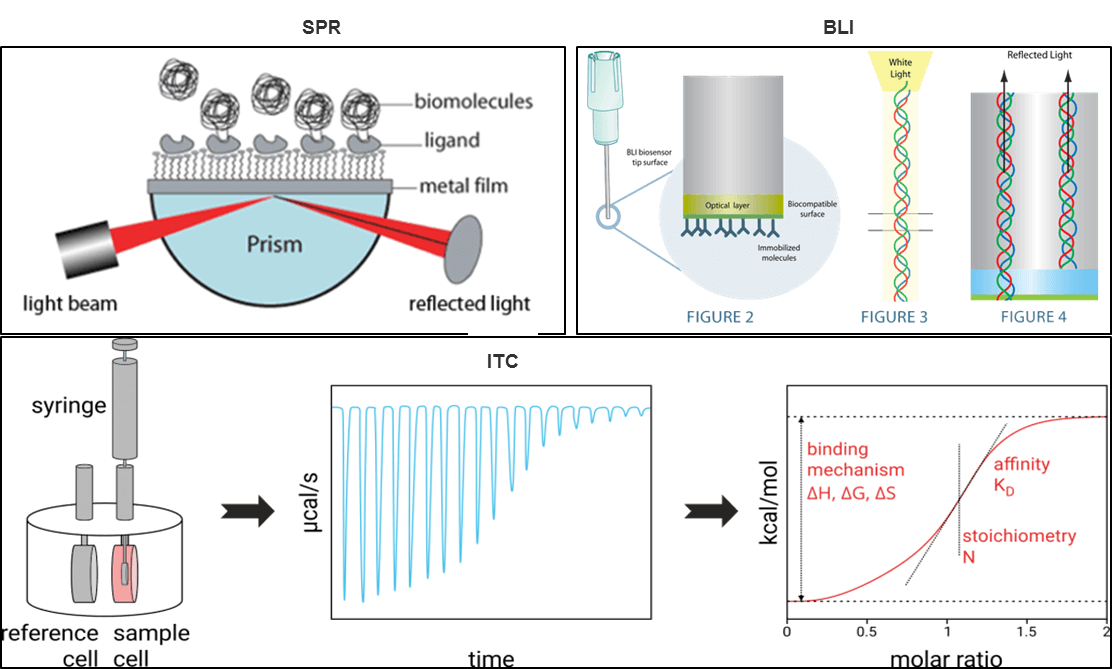Aided by world-leading equipment and talented scientists, Creative Biolabs has built up several assay platforms to satisfy various demands. Now, we are happy to introduce multiple methods which can be used to measure the affinity of TCR-like antibodies.
1. Background of TCR-Like Antibody

MHC class I molecules play important roles in the immune response against malignant cells by shaping the T-cell repertoire and presenting peptides from endogenous antigens to CD8+ cytotoxic T cells. Given to their unique specificity, MHC/peptide complexes are desirable targets for novel immunotherapeutic approaches. These complexes can be targeted either by recombinant T-cell receptors (TCRs) or by antibodies, termed TCR-like antibodies. However, most TCRs have affinities which are too low for target detection under normal assay conditions. Therefore, TCR-like antibodies with high-affinity and TCR-like specificity toward tumor epitopes, address the low affinity of TCRs. These TCR-like antibodies then become a promising new immunotherapeutic class for targeting tumor cells and mediating their specific killing. Moreover, they are also valuable research reagents enabling the study of human class I MHC/peptide ligand-presentation and TCR–peptide–MHC interactions.
2. Methods to Measure the Affinity of TCR-Like Antibodies
One major feature of TCR-like antibody is the ability to bind with certain MHC/peptide complex with high affinity and specificity in the low nanomolar affinity range. Here Creative Biolabs offers several approaches to measure the affinity using different equipment on our superior platform.

a. Surface plasmon resonance (SPR)
SPR is the resonant oscillation of conduction electrons at the interface between negative and positive permittivity material stimulated by incident light. As the most widely used method, it is label-free to measure real-time quantitative binding affinities and kinetics between TCR-like antibody and their specific MHC/peptide complex. Meanwhile, the quantities of materials used are relatively small and the method has potential to be medium-throughput.
b. Bio-layer interferometry (BLI)
BLI is a high-throughput label-free technology for measuring biomolecular interactions. It analyzes the interference pattern of white light reflected from two surfaces, one is a layer of immobilized protein on the biosensor tip, and the other is an internal reference layer. The real-time measurement requires only small quantities of materials.
c. Isothermal titration calorimetry (ITC)
ITC is a quantitative technique which can determine the binding affinity, enthalpy changes, and binding stoichiometry of the interaction between two or more molecules in solution. It is a label-free and extremely sensitive method. Besides, it also represents the gold standard method for understanding the thermodynamics of biomolecular binding processes. Furthermore, it can be used to compare interactions with similar binding affinities but different binding modes.
With years of experience, the well-trained technicians and Ph.D. level scientists in Creative Biolabs are experts at handling affinity characterization by different means. We can support each project with reliable data and timely troubleshooting. We are more than happy to share our experience and equipment with you. Please feel free to discuss with us about your requirements.
For any technical issues or product/service related questions, please leave your information below. Our team will contact you soon.
All products and services are For Research Use Only and CANNOT be used in the treatment or diagnosis of disease.
 NEWSLETTER
NEWSLETTER
The latest newsletter to introduce the latest breaking information, our site updates, field and other scientific news, important events, and insights from industry leaders
LEARN MORE NEWSLETTER NEW SOLUTION
NEW SOLUTION
CellRapeutics™ In Vivo Cell Engineering: One-stop in vivo T/B/NK cell and macrophage engineering services covering vectors construction to function verification.
LEARN MORE SOLUTION NOVEL TECHNOLOGY
NOVEL TECHNOLOGY
Silence™ CAR-T Cell: A novel platform to enhance CAR-T cell immunotherapy by combining RNAi technology to suppress genes that may impede CAR functionality.
LEARN MORE NOVEL TECHNOLOGY NEW SOLUTION
NEW SOLUTION
Canine CAR-T Therapy Development: From early target discovery, CAR design and construction, cell culture, and transfection, to in vitro and in vivo function validation.
LEARN MORE SOLUTION